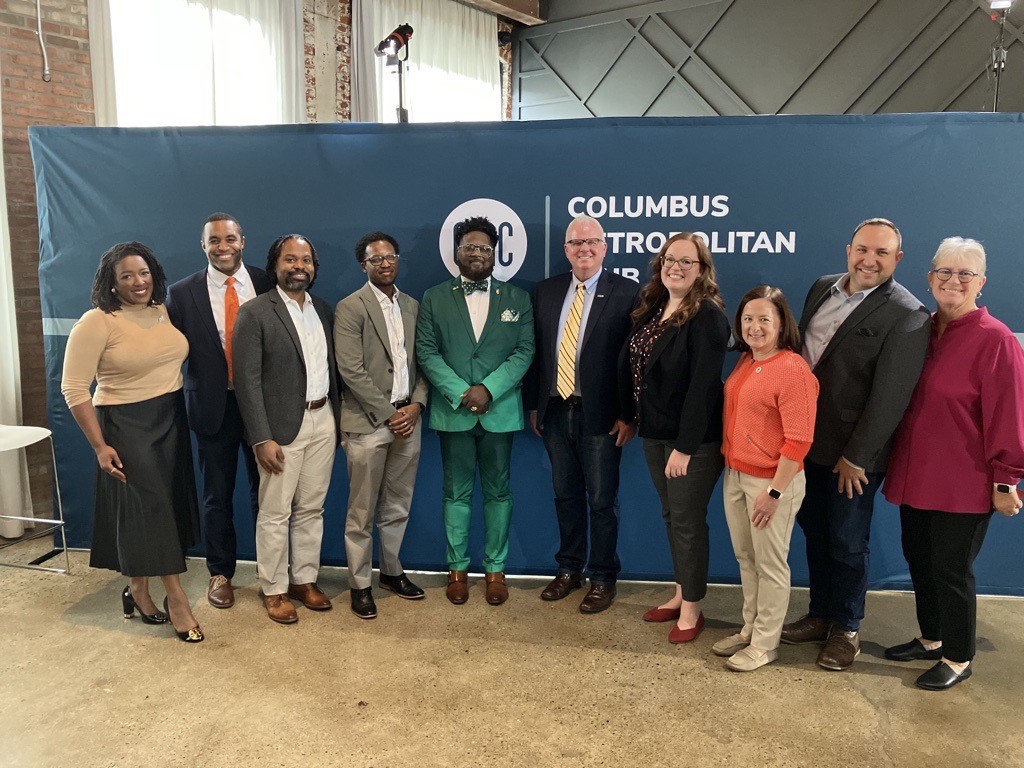Article by Tim Feran, originally posted on Columbus Underground
After years of gaining acceptance from the wider community, LGBTQ+ Americans have been under fire from far-right hate groups and legislators recently— leading the Human Rights Campaign to declare a “state of emergency.”
That resurgence in attacks is part of a pattern, panelists at the Columbus Metropolitan Club said during a forum on October 18, 2023 at The Ellis in Columbus’s historic Italian Village.
“Every time we win a battle, they try to start another battle,” said panelist Chris Equizi, Show Director of District West, the downtown bar and nightclub.
The CMC event, “Facing Hate, Finding Hope: America’s LGBTQ+ Community Under Attack,” comes as Ohio lawmakers recently introduced HB 245, which could charge drag performers with a felony if a juvenile is in attendance of a drag performance or the performance is considered “obscene.”
“I definitely think we are under attack for things that are completely wrong,” said Equizi, who performs in drag as Virginia West.
“We’re not trying to do anything sexualized with children,” Equizi said. “That’s just not happening. I guarantee the show I do at midnight is not the show I do at noon.”
“In certain groups you felt that fight was over,” said forum moderator Ronald Murray, Associate Director of Health Advocacy at Equitas Health, and President of Stonewall Columbus Board of Trustees.
”We thought we were done,” Murray said. “Now we have to link arms.”
The number of anti-LGBTQ+ bills — more than 400 — introduced in state legislatures across the United States since the start of the year has set a record, “more than double the anti-queer legislation in 2022,” said panelist J. Bennett Guess, Executive Director of the ACLU of Ohio.
“We are a convenient scapegoat,” Guess said. “That’s why educational forums like this are important.”
Another panelist, Amanda Erikson, Director of Education & Outreach at Kaleidoscope Youth Center, Inc., the largest Ohio nonprofit dedicated to serving and supporting LGTBQ+ youth, noted that activists of a certain age “like to think, ‘Oh, things are so much better,’” than decades ago.
“But we know schools right now are not generally safe for LGBTQ youth,” she said. Such students are more likely to miss class, and thus have lower test scores, and they’re likely to have higher rates of anxiety. “There could be legal discrimination, or little things we’re not aware of.”
Panelist Khris Goins, President/Founder of Black Transmen of Ohio, has background in IT and put at least some of the blame for the rising tide of hate on social media.
“The algorithm comes in and feeds this,” Goins said. “They (those prone to hate) fall into these bubbles and it feeds their mindset. Fear is the great distraction. Picking on gay people is easy. We’re an easy target.”
Guess remembered that in 2004 when Ohio was set to vote on a constitutional amendment against same-sex marriage, “we knew it was going to pass … it was depressing.” The pastor at his church asked the congregation if everyone who was going to be affected by the vote would stand.
“I can still remember the moment when everyone was standing,” Guess said.
As the CMC audience applauded, Guess concluded that it is important for both the LGBTQ+ and the wider community to realize “an injury against one is an injury against all of us.”
The hope for the future is “in generations coming after me,” Equizi said. “I’m probably oldest drag queen I work with. We’re always afraid. They (younger performers) are not afraid.”
“Young people are claiming pronouns we’ve never heard of,” Erikson said. “I think we have too many adults trying to shut them down a bit. We need to be open to any number of pronouns — and remember what it was like to be a teenager.”
While panelists agreed that the younger generation is providing a ray of hope, one audience member cautioned that, “We need to pave the way for all children to thrive.”
Jaron Terry, the head of PFLAG Columbus, the nonprofit that provides support, education and advocacy for parents, families and friends of LGBTQ+ people, cautioned that at local school boards “horrifying people are coming for the purpose of harming children.”
Goins offered one solution to fight against such opposition: “It’s always the loudest person in the room who’s always wrong,” Goins said. “What can we do to be louder? Show up, period. As my mom taught me, a closed mouth don’t get fed.”
Calling or writing their statehouse legislators as well as national leaders does work, too, Guess said.
And Equizi reiterated Goins’ point, that sometimes just showing up at a school board meeting makes a difference.
“It’s so much easier for people to show up with bigoted views when we’re not there.”

